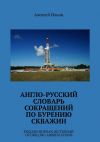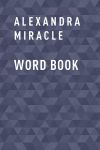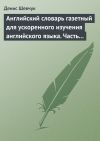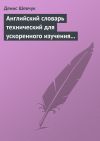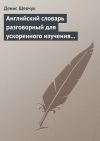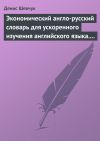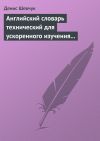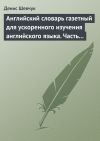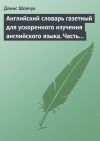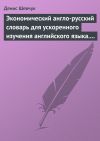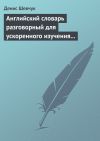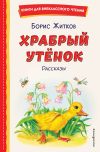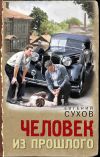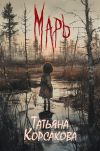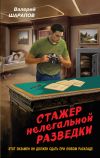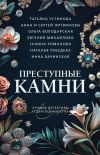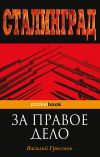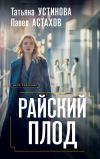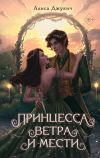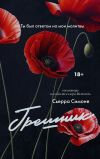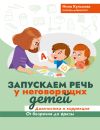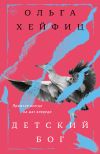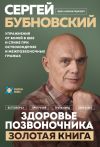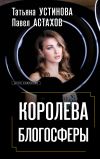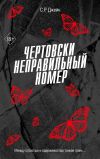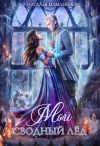Текст книги "Английский язык"
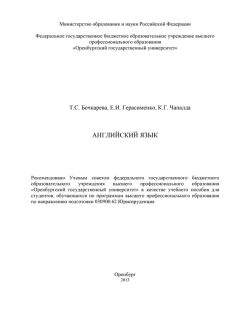
Автор книги: Елена Герасименко
Жанр: Учебная литература, Детские книги
сообщить о неприемлемом содержимом
Текущая страница: 9 (всего у книги 9 страниц)
Приложение Б (справочное)
Ключи
Б.1 Грамматика
Б.1.1 Артикль. Упражнения для самостоятельной работы
Б.1.1.1 Дополните предложения артиклями a/an, the.
1) –
2) –
3) a
4) the
5) the, an
6) the, – , –
7) the, the, –
8) – , an, the, –
Б.1.1.2 Выберите правильный вариант.
1) Catherine loves cats.
2) Look at the cats! They are chasing a bird.
3) I don't like coffee, but I like tea.
4) You cut the cake and I'll pour coffee.
5) Life will be very different in the future.
6) The life of a mayfly is extremely short.
7) I enjoy swimming in the sea.
8) Children usually like playing games.
9) The children have gone to the park.
10) All the people in this room are my relative.
11) All people should have freedom of speech.
12) The villages in this part of the country are very beautiful.
13) Breakfast is the most important meal of day/the day.
14) Paul was the only person who remembered me.
15) In the Stone Age, people lived in caves.
16) I would like to travel to Spain.
17) We travelled to London by train.
18) He is learning to play the flute.
Б.1.1.3 Вставьте артикль, где необходимо.
1. This is a clock. 2. This is Kiev. 3. Kiev is a big city. 4. Mary is a girl. 5. She is my sister. 6. This is a room. 7. Is a newspaper in the bag? 8. She is in the room. 9. Is a teacher in the classroom? 10. Is your room large? 11. Is a pen in the bag? 12. Are you students? 13. My friend has the children. 14. The sportsmen are always in good form. 15. The children we saw in the street are schoolboys. 16. She lives in the 1st Street.
Б.1.1.4 Вставьте артикль, где необходимо.
1. This is a book. It is my book. 2. Is this your pencil? – No, it isn't my pencil, it is my sister's pencil. 3. I have a sister. My sister is an engineer. My sister's husband is a doctor. 4. I have no handbag. 5. Is this a watch? – No, it isn't a watch, it's a pen. 6. This pen is good, and that pen is bad. 7. I can see a pencil on your table, but I can see no paper. 8. Give me a chair, please. 9. They have a dog and two cats. 10. I have a spoon in my plate, but I have no soup in it.
Б.1.1.5 Вставьте артикль, где необходимо.
1. This is a tree. The tree is green. 2. I can see three boys. Boys are playing. 3. I have a bicycle. The bicycle is black. My friend has no bicycle. 4. Our room is large. 5. We wrote a dictation yesterday. The dictation was long. 6. She has two daughters and one son. Her son is a pupil. 7. My brother's friend has no dog. 8. This pencil is broken. Give me that pencil, please. 9. She has a ball. The ball is big. 10. I got a letter from my friend yesterday. The letter was interesting.
Б.1.1.6 Вставьте артикль, где необходимо.
1. This is a pen. The pen is red. 2. These are pencils. The pencils are black. 3. This is soup. The soup is tasty. 4. In the morning I eat a sandwich and drink tea. 5. She gave me coffee and a cake. The coffee was hot. The cake was tasty. 6. Do you like ice cream? 7. I see a book in your hand. Is the book interesting? 8. Do you need a camera? 9. He never eats meat, he always eats vegetables, cereals, seeds, fruit, and nuts. He is a vegetarian. 10. This is a pineapple. The pineapple is delicious. 11. Elaine, apples are good for you! 12. My cousin is upset. He's got a sore throat. 13. This is cottage cheese. The cottage cheese is fresh. 14. She bought meat, butter and potatoes yesterday. She also bought a cake. The cake was very tasty. We ate the cake with tea. 15. This is my table. On the table I have a book, two pencils, a pen and paper. 16. This is a bag. The bag is brown. It is my sister's bag. And this is my bag. It is yellow.
Б.1.1.7 Вставьте артикль, где необходимо.
1. I have two sisters. My sisters are students. 2. We are at home. 3. My brother is not at home, he is at school. 4. My mother is at work. She is a doctor. 5. I am not a doctor. 6. I have no sister. 7. He is not a pilot. 8. I have thirty-two teeth. 9. He has a child. 10. She has two children. Her children are at school. 11. Is your father at home? – No, he is at work. 12. Where is your brother? – He is at home.
Б.1.1.8 Вставьте артикль, где необходимо.
1. We have a large family. 2. My granny often tells us long interesting stories. 3. My father is an engineer. He works at a factory. The factory is large. 4. My mother is a doctor. She works at a large hospital. She is at work now. 5. My aunt is a teacher. She works at school. The school is good. My aunt is not at school now. She is at home. She is drinking tea and eating jam. The jam is sweet. I am at home, too. I am drinking tea and eating a sandwich. The sandwich is tasty. 6. My sister is at school. She is a pupil. 7. My cousin has a big black cat. My cousin's cat has two kittens. The cat likes milk. The kittens like milk, too. 8. I am an engineer. 9. My son is a pupil, 10. He is a good pupil. 11. This is a house. 12. This is my pencil. 13. You have some pencils, but I have no pencil. Give me a pencil, please.
Б.1.1.9 Вставьте артикль, где необходимо.
1. I am an engineer. 2. My son is a pupil. 3. He is a good pupil. 4. This is a house. 5. This is my pencil. 6. You have some pencils, but I have no pencil. Give me a pencil, please. 7. I like your beautiful flower. Give me the flower, please. 8. My mother is at home. She is reading an interesting book. 9. My father is not at home. He is at work. He is a doctor. He is the good doctor. He works at a hospital. The hospital is large.
Б.1.1.10 Вставьте артикль, где необходимо.
1. What's the weather like today? – The weather is fine. 2. The sun is yellow. 3. The sky is grey today. 4. The Earth is a planet. 5. We had an English lesson yesterday. The teacher asked me many questions. The questions were difficult. 6. Where is your brother?
– He is at home. He is in his room. He is sitting at the table. He is doing his homework. The homework is difficult. 7. Our cat is sitting on the sofa. 8. It is very dark in the room. Turn on the light, please. 9. Nick went into the bathroom, turned on the water and washed his hands.
Б.1.1.11 Вставьте артикль, где необходимо.
At the beginning of the 19th century a little boy was born in the family of John Dickens, a clerk at an office in Portsmouth, and was named Charles. He had a sister who was older than himself, and there were several other children in the family. When Charles was seven, he was sent to school. He was not a strong child. He did not like to play cricket or football and spent all his free time reading. In 1821 the family went to London and little Charles left behind him the happiest years of his childhood. His father was in money difficulties, and the family became poorer and poorer. The boy had to give up his studies. Mr. Dickens was put into a debtors' prison. Little Charles learned to know all the horrors and cruelty of a large capitalist city. He had to go to work at a blacking factory. He worked there from morning till night. When his father came out of prison, Charles was sent to school for some time. Soon he got work as a clerk. Then he learned stenography and became a reporter in Parliament. In 1836 at the age of 24 Charles Dickens published his first book. It was a collection of stories. The title of the book was “Sketches by Boz”. These were followed by “Pickwick Papers” and “Oliver Twist” and many other famous novels. Charles Dickers is one of the greatest writers of the 19th century. His novels are now translated into most languages of the world.
Б.1.2 Имя существительное. Упражнения для самостоятельной работы
Б.1.2.1 Поставьте следующие существительные во множественное число.
Stars, mountains, trees, shillings, kings, the waiters, the queens, men, the men, women, the women, eyes, shelves, boxes, the cities, boys, geese, the watches, mice, dresses, toys, the sheep, teeth, children, the oxen, deer, the lives, tomatoes.
Б.1.2.2 Поставьте следующие существительные во множественное число.
1. These are stars. 2. These are boys. 3. These are babies. 4. Those are plates. 5. Those are flowers. 6. Those are bookshelves. 7. Are these sofas? 8. Are these bookcases? 9. Are these men? 10. Are those balls? 11. Are those trains? 12. Are those planes? 13. Are the windows open? 14. Are the doors closed? 15. Are the boys near the windows? 16. Those is not kings. 17. Those are not queens. 18. Those are not buses. 19. These aren't mountains. 20. Those aren't geese. 21. These aren't mice. 22. There are sheep. 23. There are cigarettes. 24. There are cats. 25. There are not girls. 26. There aren't bags. 27. There aren't trees. 28. There are not bad eggs. 29. There are good eggs. 30. Are those flowers?
Б.1.2.3 Поставьте следующие существительные во множественное число.
1. These men are engineers. 2. Those women are my sisters. 3. These children are my sons. 4. Those geese are big. 5. These mice are white. 6. These men are doctors. 7. Those women are my cousins. They are teachers. 8. Those girls are my nieces. They are pupils. 9. These girls have blue sweaters. 10. These boys have good coats. 11. My uncles have large flats. 12. There are tables in the room. 13. I have good pens. My pens are in my pocket. 14. There are flowers in the vase. 15. These children's feet are sore.
Б.1.2.4 Поставьте следующие предложения во множественное число.
1. What are those children's names? 2. The cats have caught mice. 3. There were ladies, gentlemen, boys and girls in the room. 4. In the farm-yard we could see oxen, sheep, cows and geese. 5. Are these workers Englishmen or a Germen? – They are Frenchmen. 6. Why don't you eat these potatoes? 7. These strawberries are still green. 8. The withered leaves have fallen to the ground. 9. Can you see birds in those trees? 10. Do your teeth still ache? 11. I held up my feet to the fire to warm it. 12. His children study very well. 13. These men work at our office. 14. There are new houses in our street. 15. These stories are very interesting. 16. I have hurt my feet. 17. The wolves have been shot. 18. He keeps his toys in boxes. 19. Put these knives on those tables.
Б.1.3 Прилагательное, наречие. Степени сравнения. Упражнения для самостоятельной работы
Б.1.3.1 Переведите на английский язык.
Old, older, the oldest, the eldest, my elder brother, my old friend, further, the furthest, the longest, shorter, happy, happier, the happiest, the best, the blackest, longer, worse, better, warmer, her best friend, her younger son, her elder son.
Б.1.3.2 Переведите следующие предложения на английский язык.
1 а) Я знаю интересную историю. I know an interesting story. б) Он знает более интересную историю. He knows more interesting story. в) Она знает самую интересную историю. She knows the most interesting story. 2 а) Это длинный путь. This is a long way. б) Это более длинный путь. This is longer way. в) Это самый длинный путь. This is the longest way. 3 а) Ее работа очень важна. Her work is very important. б) Его работа важнее. His work is more important. в) Моя работа самая важная. My work is the most important. 4. а) Это плохая песня. This is a bad song. б) Это еще более плохая песня. This is a worse song. в) Это самая плохая песня. This is the worst song. 5 а) Он хороший инженер. He is a good engineer. б) Он более хороший инженер. He is better engineer. в) Он самый лучший инженер. He is the best engineer. 6 а) Он принес ей красивый цветок. He brought her a beautiful flower. б) Он принес ей более красивый цветок. He brought her a more beautiful flower. в) Он принес ей самый красивый цветок. He brought her the most beautiful flower. 7 а) Он рассказал нам о счастливом человеке. He told us about a happy man. б) Он рассказал нам о более счастливом человеке. He told us about a happier man. в) Он рассказал нам о самом счастливом человеке. He told us about the happiest man. 8 Это были самые счастливые дни в ее жизни. It was the happiest days of her life. 9 Это очень легкая задача. Дайте мне более трудную задачу. This is very easy task. Give me more difficult task. 10 Летом дни длинные, а ночи короткие. In summer days are longer but nights are shorter. 11 22 июня – самый длинный день. June 22 is the longest day. 12 В июле дни короче. Days are shorter in July. 13 В декабре дни самые короткие. Days are the shortest in December. 14 «Четверка» – хорошая отметка, но «пятерка» лучше. “Four” is a good mark but “Five” is better. 15 «Пятерка» – самая лучшая отметка. “Five” is the best mark. 16 Самая плохая отметка – «двойка». The worst mark is “two”. 17 Твое платье, конечно, очень красивое, но мое платье красивее. Your dress is certainly very beautiful but my dress is more beautiful. 18 Мой папа высокий мужчина. My father is a tall man. 19 Это более теплое пальто. This is warmer coat.
Б.1.3.3 Раскройте скобки, употребляя требующуюся форму прилагательного.
1. Which is larger: the United States or Canada? 2. What is the name of the biggest port in the United States? 3. Moscow is the largest city in Russia. 4. The London underground is the oldest in the world. 5. There is a greater number of cars and buses in the streets of Moscow than in any other city of Russia. 6. St. Petersburg is one of the most beautiful cities in the world. 7. The rivers in America are much bigger than those in England. 8. The island of Great Britain is smaller than Greenland. 9. What is the name of the highest mountain in Asia? 10. The English Channel is wider than the straits of Gibraltar. 11. Russia is a very large country.
Б.1.3.4 Переведите следующие предложения на английский язык.
1) Этот дом такой же высокий, как тот. This house is as tall as that one.
2) Сегодня вода в реке не такая теплая, как вчера. Today the water is not as warm as yesterday in the river.
3) Ты не такой умный, как папа. You are not as clever as your father.
4) Индия не такая большая, как Китай. India is not as big as China.
5). Темза такая же красивая, как Нева. The Thames is as beautiful as the Neva.
6) Его бабушка не такая старая, как дедушка. His granny (grandmother) is not as old as grandfather.
7) Яблоки такие же вкусные, как сливы, но не такие вкусные, как груши. Apples are as tasty as plums but not as tasty as pears.
8) Русский музей такой же богатый, как Эрмитаж? The Russian Museum is as rich as the Hermitage.
9) Державин не такой знаменитый, как Пушкин. Derjavin is not as famous as Pushkin.
10) Днепр не такой длинный, как Волга. The Dnieper River is not as long as the Volga.
11) В прошлом году август был такой же жаркий, как июль. Last year August was as hot as July.
Б.1.3.5 Раскройте скобки, употребляя требующуюся форму прилагательного.
1. This man is taller than that one. 2. Asia is larger than Australia. 3. The Volga is (short) than the Mississippi. 4. Which building is the highest in Moscow? 5. Mary is a better student than Lucy. 6. The Alps are higher than the Urals. 7. This garden is the most beautiful in our town. 8. She speaks Italian better than English. 9. Is the word “newspaper” longer than the word “book”? 10. The Thames is shorter than the Volga. 11. The Arctic Ocean is colder than the Indian Ocean. 12. Chinese is more difficult than English. 13. Spanish is easier than German. 14. She is not so busy as I am. 15. It is as cold today as it was yesterday. 16. She is not so fond of sports as my brother is. 17. Today the weather is colder than it was yesterday. 18. This book is more interesting of all I have read this year. 19. January is the coldest month of the year. 20. My sister speaks English worse than I do. 21. Which is the hottest month of the year? 22. Which is the most beautiful place in this part of the country? 23. This nice-looking girl is the best student in our group.
Б.1.3.6 Закончи предложения, образовав и вставив сравнительную степень из данных прилагательных и наречий: crowded, early, easily, expensive, interested, large, near, often, quiet, thin.
1) This jacket is too small. I need a larger size.
2) You look thinner. Have you lost weight?
3) He is not so keen on his studies. He's more interested in having a good time.
4) You will find your way around the town more easily if you have a map.
5) You are making too much noise. Can you be a bit quieter?
6) There were a lot of people on the bus. It was more crowded than usual.
7) You are late. I expected you earlier.
8) You hardly ever write to me. Why don't you write a bit more often?
9) The hotel was surprisingly cheap. I thought it would be much more expensive.
10) It's a pity you live so far away. I wish you lived nearer.
Б.1.4 Числительное. Упражнения для самостоятельной работы
Б.1.4.1 Напишите следующие количественные числительные буквами.
One, two, three, four, five, eleven, twelve, fourteen, fifteen, twenty-one, twentyfive, twenty-eight, thirty, fifty-two, sixty-seven, seventy-four, eighty-three, ninety-nine, one hundred.
Б.1.4.2 Образуйте соответствующие порядковые числительные.
First, second, third, fourth, fifth, eleventh, twelfth, fourteenth, fifteenth, twentyfirst, twenty-fifth, twenty-eighth, thirtieth, fifty-second, sixty-seventh, seventy-fourth, eighty-third, ninety-ninth, one hundredth.
Б.1.4.3 Напишите на английском.
1) Two hundred and forty-five, five hundred and thirty-three, eight hundred and sixteen.
2) Three thousand five hundred and sixty-two, seven thousand three hundred and twenty-four.
3) One hundred books, a hundred (of) pages, hundreds of people.
4) One thousand cars (a thousand cars), thousands of people, millions of books.
5) Two and three is five (two plus three equals five), seven minus four is three, three multiplied by five is fifteen, ten divided by two is five.
6) The 1st of January (1 January, January 1 – The first of January, January the first), the 8th of March (8 March, March 8 – The eighth of March, March the eighth).
7) Chapter five, bus six.
8) Three point four five, eight point zero nine.
9) Two thirds, four fifths.
Б.1.4.4 Переведите на английский язык.
1) 25 км – twenty five kilometers; 163 тысячи рублей – one hundred and sixty three thousand rubles; 90 картин – ninety pictures; 200 миллионов людей – two hundred million people; 3500 автомобилей – three thousand five hundred automobiles; 4 тысячи машин – four thousand automobiles.
2) Сотни автомобилей – hundreds of automobiles; тысячи студентов – thousands of students; миллионы людей – millions of people.
Б.1.4.5 Переведите на английский язык.
30 марта – the thirtieth of March; 1 ноября – the first of November; 15 сентября – the fifteenth of September; 2 июля – the second of July; к 3 августа – by the third of August; к 14 апреля – by the fourteenth of April; к 29 ноября – by the twenty ninth of November; к 24 февраля – by the twenty-fourth of February.
Б.2 Аудирование
Б.2.1 Модуль 1

Б.2.2 Модуль 2

Б.2.3 Модуль 3

Б.2.4 Модуль 4

Правообладателям!
Это произведение, предположительно, находится в статусе 'public domain'. Если это не так и размещение материала нарушает чьи-либо права, то сообщите нам об этом.